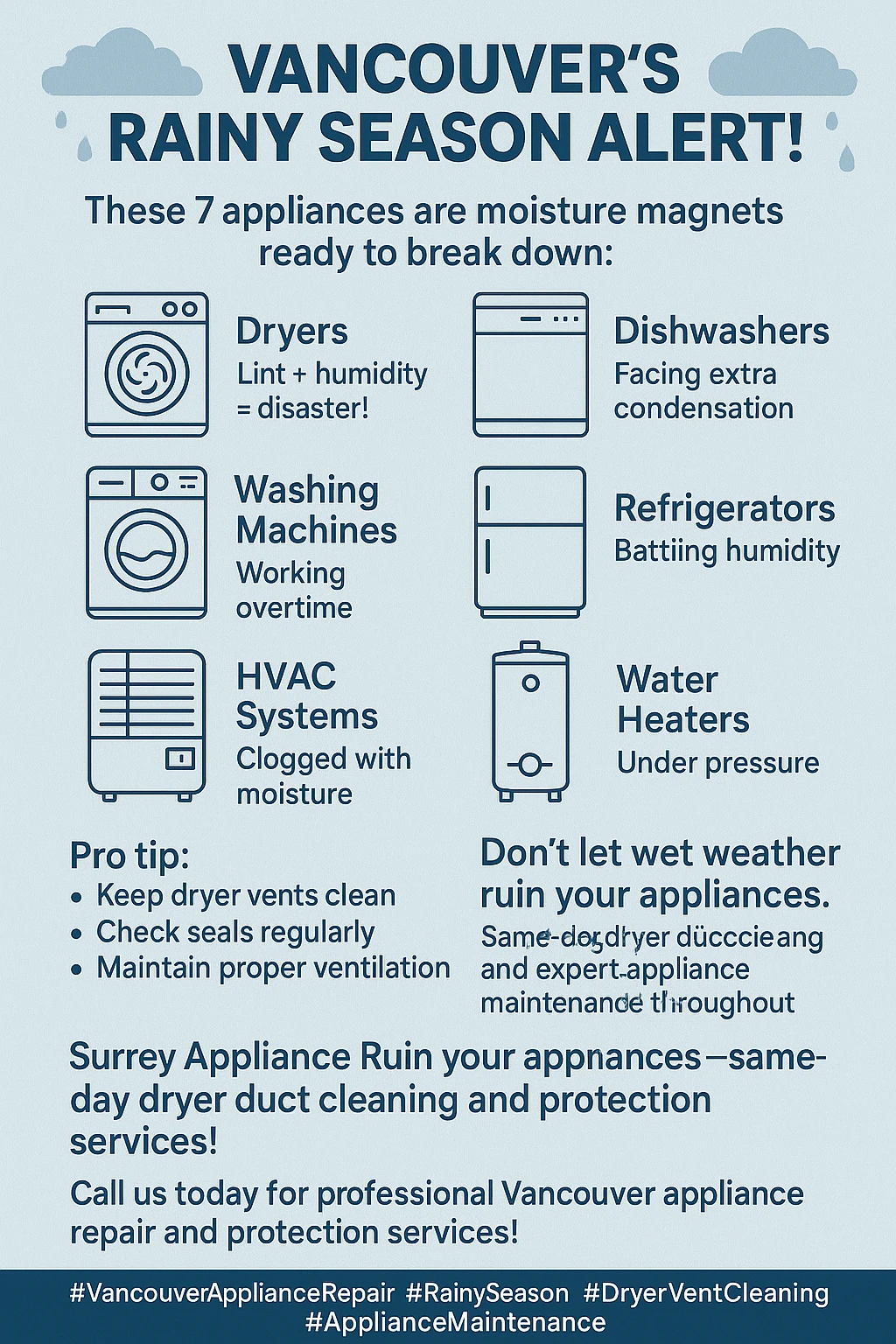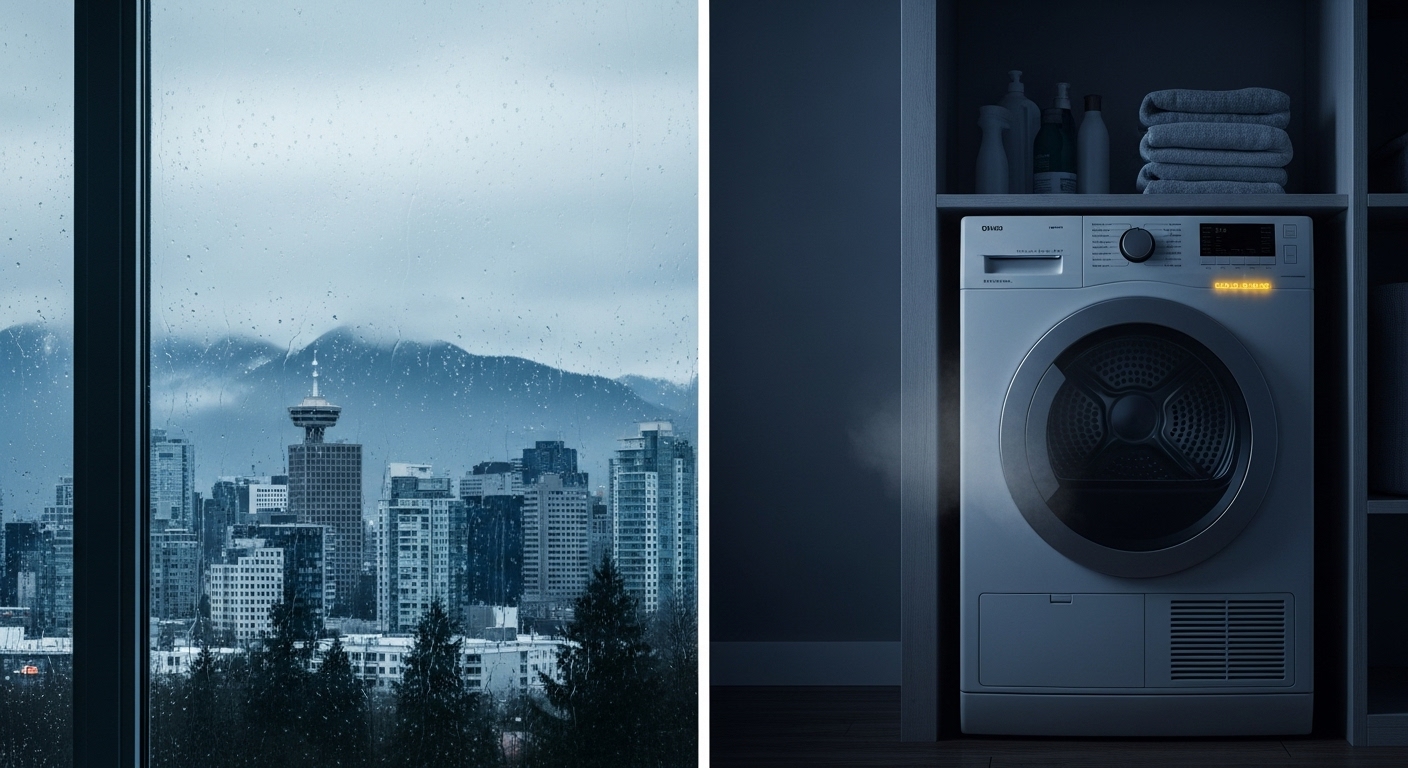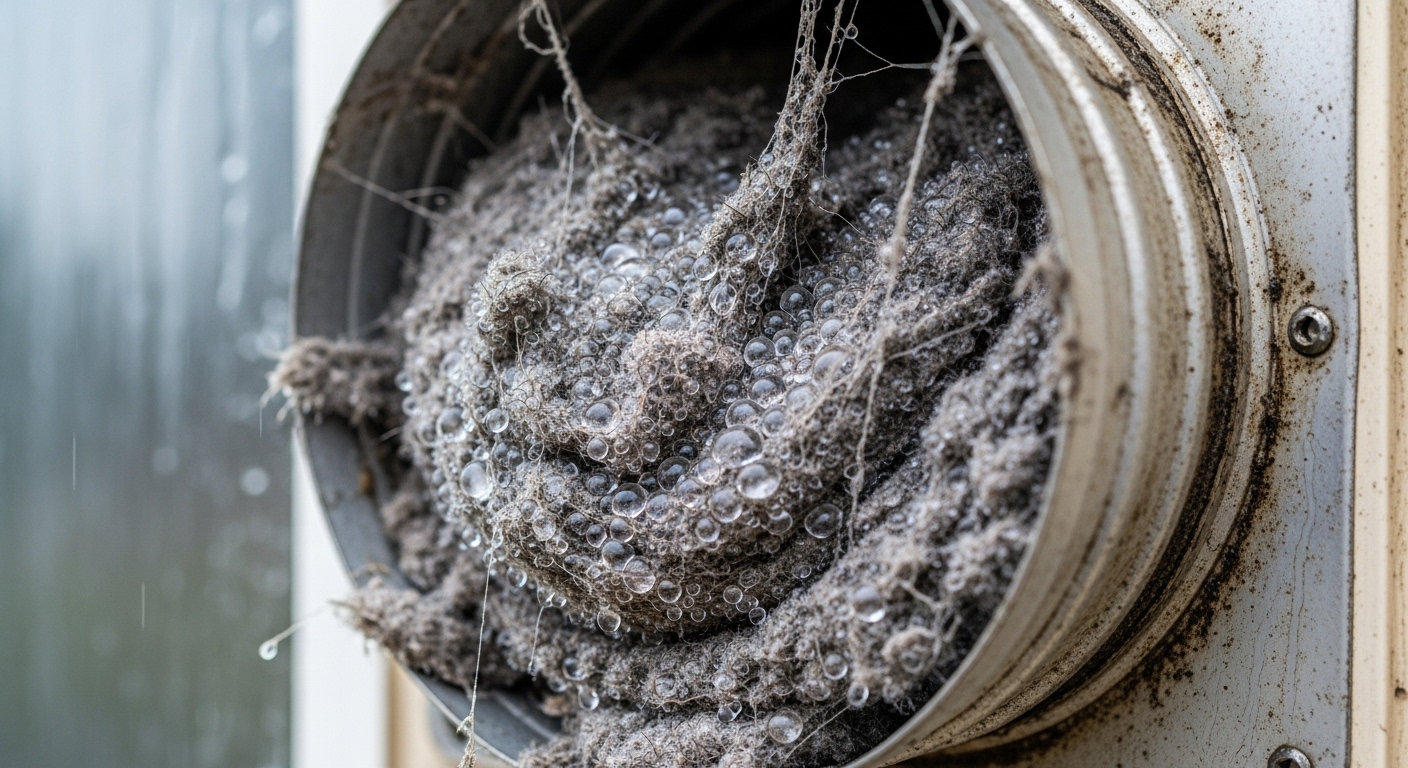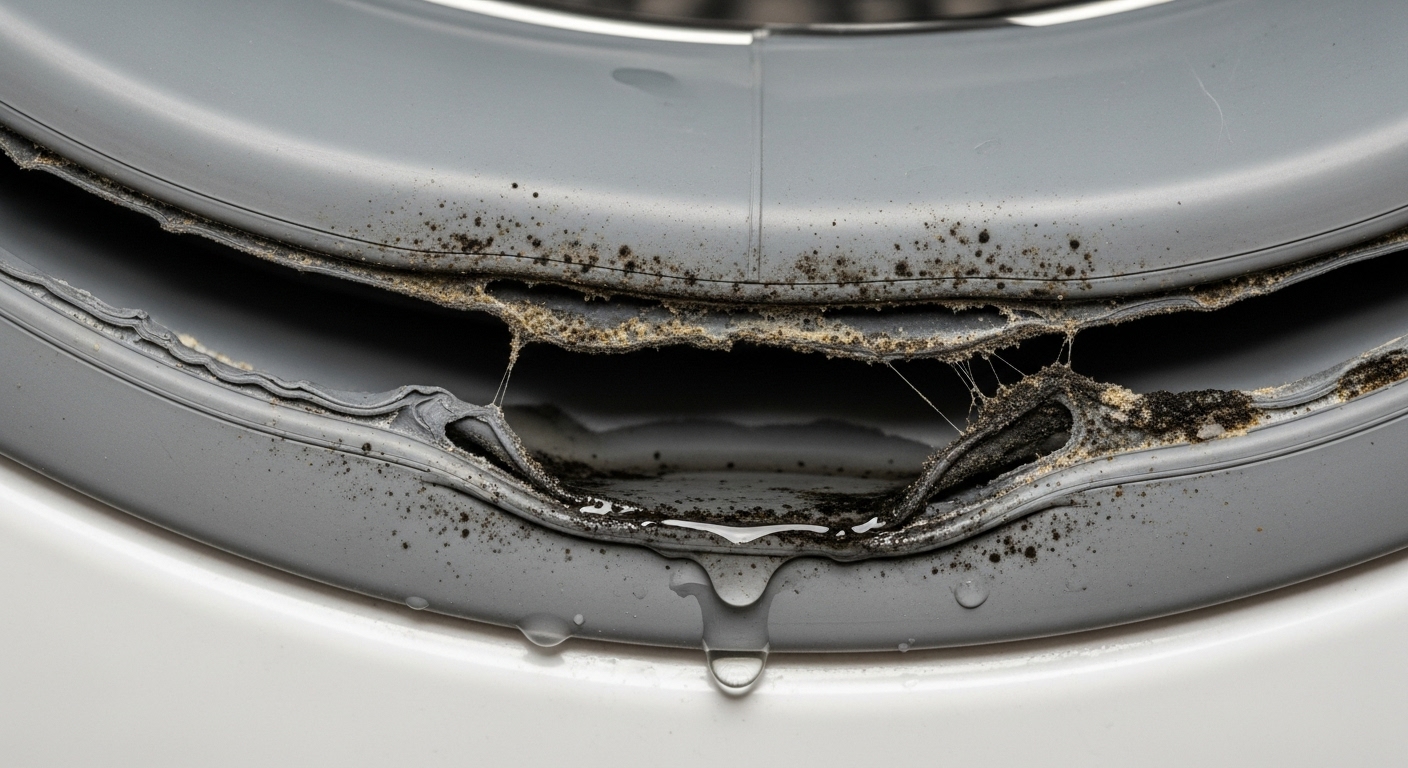Wondering why your appliances seem to break down more often during Vancouver’s endless rainy months? You’re not imagining it – our coastal climate creates a perfect storm of conditions that can slash your appliance lifespan by up to 40% compared to drier locations, turning what should be reliable household helpers into expensive repair headaches. Picture this: it’s February in Vancouver, and you’ve just endured your sixth consecutive week of drizzle. Your dryer has been working overtime trying to handle all the damp clothes, your dishwasher seems sluggish despite using the same detergent, and there’s a mysterious musty smell coming from somewhere near your washing machine. What you’re experiencing isn’t a string of bad luck – it’s the direct result of Vancouver’s unique coastal environment systematically attacking your most essential appliances in ways that most homeowners never see coming. The thing about living in this gorgeous city is that the same weather that keeps our mountains green and our gardens lush is also creating havoc inside our homes. Unlike prairie cities where temperatures stay consistently cold, or desert locations with predictable dry heat, Vancouver’s constant freeze-thaw cycles stress appliance components through repeated expansion and contraction. Add in the salt-laden ocean air that can penetrate surprising distances inland, plus humidity levels that regularly exceed what most appliances were designed to handle, and you’ve got a recipe for premature breakdowns that can cost thousands in repairs and replacements. The financial impact extends far beyond simple repair bills. When your refrigerator’s compressor fails early due to corroded coils, or your dryer breaks down because moisture has infiltrated its control systems, you’re looking at emergency replacement costs during the worst possible weather. Smart Vancouver homeowners who understand these unique challenges and take proactive steps can extend their appliance lives by 3-5 years while avoiding most of those heart-stopping moments when essential equipment fails right when you need it most.
Key Outtakes
- Vancouver’s coastal humidity reduces appliance lifespan by 20-30% compared to interior locations due to salt air corrosion and moisture damage
- Spring appliance maintenance can prevent 80% of summer breakdowns and extend appliance lifespan by up to 40%
- Proper moisture protection strategies can extend appliance lifespans by 3-5 years while dramatically reducing repair frequency
- Vancouver’s freeze-thaw cycles stress appliance components more than consistent cold temperatures, making targeted protection essential
- Comprehensive humidity control measures cost far less than premature appliance replacement or frequent repair interventions

Understanding Vancouver’s Unique Climate Challenge
Before diving into specific appliances, it’s crucial to understand why Vancouver’s climate is particularly brutal on household equipment. Our city sits in a unique microclimate where ocean moisture meets mountain barriers, creating conditions that are tougher on appliances than many extreme weather locations. While we don’t face the brutal winters of the prairies or scorching desert summers, our constant moisture exposure and temperature fluctuations create a slow-burn assault on appliance components that can be even more damaging over time.

The salt air factor is real and reaches much further inland than most people realize. During storms or high winds, salt particles can travel up to 25 kilometers from the coast, gradually accumulating on and within household appliances where they initiate aggressive corrosion processes. This isn’t just about appliances near the waterfront – homes in Burnaby, Richmond, and even parts of Surrey can show signs of salt corrosion that dramatically reduces equipment lifespans. Vancouver’s humidity levels create their own special challenges for appliance operation. During our infamous rainy season, indoor relative humidity frequently climbs above 60%, well beyond the 30-50% range that most appliances were designed to handle. This elevated moisture doesn’t just create surface condensation – it penetrates deep into internal mechanisms where it promotes corrosion, encourages mold growth, and provides the conditions necessary for electrical failures. The temperature swings we experience, while moderate compared to other Canadian cities, still cause significant thermal stress on appliance components. Materials expand and contract repeatedly as temperatures fluctuate between near-freezing nights and mild days, causing seals to crack, connections to loosen, and components to fail prematurely. This thermal cycling is particularly hard on rubber gaskets, plastic components, and electronic systems that weren’t designed for such frequent expansion-contraction cycles.
Dryers: The Number One Casualty of Vancouver’s Wet Climate
Now that we understand the broader climate challenges, let’s examine the appliances that suffer most during Vancouver’s rainy season, starting with the biggest victim of our humid conditions. Dryers bear the brunt of Vancouver’s wet climate because they’re fighting a losing battle against moisture from multiple directions. During our October-through-March rainy season, these hardworking machines run 50% more often than they would in drier climates, as families struggle to dry clothes indoors and deal with constantly damp items. This increased usage, combined with Vancouver’s average 73% humidity that reaches 88% in winter, forces dryers to work significantly harder to remove moisture from clothes, leading to longer drying times and accelerated wear on heating elements and motors. The vent condensation problem becomes critical in Vancouver’s climate because our cool outdoor temperatures create condensation when warm dryer air meets cold vent surfaces. This moisture accumulation can freeze during sudden cold snaps, blocking airflow and forcing your dryer to work overtime. Environmental conditions during hot and humid days make it even harder to prevent moisture from entering dryer systems, with condensation occurring even in properly ventilated units when the temperature differential becomes too extreme. Professional vent cleaning becomes essential, with experts recommending annual service minimum, though Vancouver’s conditions often require bi-annual cleaning during peak rainy season months. Here’s a unique challenge that most articles don’t mention: Vancouver’s coastal wind patterns can create backdraft conditions that push humid ocean air back into dryer vents, causing reverse condensation that damages internal components and promotes mold growth in vent systems. This phenomenon can occur even when vents appear to be functioning normally, making regular inspection of vent flaps and exterior openings crucial for preventing moisture infiltration. Lint buildup accelerates dramatically in humid conditions because moisture causes lint to clump and stick to vent walls more readily than in dry climates. Clogged dryer vents cause thousands of house fires annually, with damages exceeding $233 million, and 92% of dryer fires result from lint buildup. The stakes are particularly high during Vancouver’s rainy season when dryers are running constantly and lint accumulation happens faster than normal.

Prevention strategies for dryers in Vancouver’s climate focus on moisture management and regular maintenance. Clean the lint screen after every single load, and wash it weekly with warm soapy water to remove fabric softener residue that reduces airflow. Check your exterior vent regularly for blockages, ice formation, or damaged flaps that don’t close properly. Consider installing a moisture sensor alarm that alerts you to excessive humidity levels in your laundry area, and ensure adequate ventilation around your dryer to prevent moisture buildup in the surrounding space.
Washing Machines: When Moisture Meets More Moisture
Washing machines face the double challenge of dealing with water internally while fighting Vancouver’s external humidity, creating perfect conditions for mold growth, seal deterioration, and mechanical failures. The problems start with our temperature swings, which create expansion and contraction cycles that gradually weaken rubber seals around washing machine tubs, leading to leaks and inefficient operation over time. Front-loading washing machines are particularly vulnerable in Vancouver’s humid conditions because their rubber door seals create perfect breeding conditions for mold and bacteria. The horizontal drum design means water can pool in the seal folds, and when combined with our consistently high humidity levels, this creates a petri dish for biological growth that can cause persistent odors and health concerns. The seal deterioration happens faster in coastal climates because salt air accelerates rubber degradation, causing cracks that allow water leaks and reduce washing efficiency.

Hard water conditions in areas like Richmond and Burnaby compound the problems by causing mineral buildup that gradually clogs systems and reduces efficiency. This scale accumulation affects water lines, pumps, and internal components, forcing systems to work harder and increasing the likelihood of mechanical failure. The combination of mineral deposits and high humidity creates ideal conditions for corrosion of metal components throughout the washing system. An often-overlooked issue in Vancouver homes is electrical component corrosion caused by salt air penetration through ventilation systems. This coastal air can reach indoor laundry areas up to 15 kilometers inland, causing gradual corrosion of washing machine control boards and electronic sensors that manifests as intermittent operational failures. These problems often start small – delayed cycle starts, incomplete cycles, or error codes that come and go – but gradually worsen until major repairs become necessary.
Refrigerators: Fighting the Humidity Battle Around the Clock
Moving from laundry appliances to kitchen equipment, refrigerators are engaged in a constant struggle against Vancouver’s humidity, working harder to maintain cool temperatures and prevent moisture-related problems. During rainy months, every time you open your refrigerator door, you’re letting in humid air that forces the compressor to work harder to remove that moisture. This increased workload leads to higher energy consumption and premature compressor failure, which is one of the most expensive refrigerator repairs.

Condenser coil efficiency is another major casualty of our climate. These coils, located at the back or bottom of your refrigerator, are designed to release heat. In Vancouver’s dusty and humid environment, they quickly become caked with dust and pet hair that sticks to moisture on the coils, creating an insulating blanket that prevents heat from escaping. This forces the compressor to run almost continuously, increasing energy bills by up to 30% and dramatically shortening the appliance’s lifespan. Salt air corrosion is a silent killer for refrigerator components, especially for homes within 10 kilometers of the coast. The salt gradually eats away at metal parts, including condenser coils, electrical connections, and even door hinges, leading to refrigerant leaks and control board failures. Door seal integrity is also compromised by constant humidity and temperature fluctuations, causing seals to become brittle or moldy. When seals fail, warm, moist air constantly enters the refrigerator, creating condensation problems and forcing the cooling system to work overtime.
Dishwashers: The Unseen Victims of Hard Water and Humidity
Dishwashers might seem protected from external humidity, but they face a combined assault from hard water and the ambient moisture that affects their electronic components. Vancouver’s water hardness varies by municipality, with areas like Richmond experiencing harder water that leaves mineral deposits on heating elements and spray arms. This buildup reduces cleaning efficiency and forces the dishwasher to run longer cycles, increasing wear and tear on pumps and motors.

The real hidden danger for dishwashers in our climate is electronic control board failure. These sensitive components are often located at the bottom of the unit, making them vulnerable to moisture from minor leaks or high ambient humidity in the kitchen. Corrosion on these boards can cause erratic behavior, such as cycles that won’t start, stop mid-wash, or display confusing error codes. Rust and corrosion are accelerated by the combination of internal moisture and external humidity, particularly affecting the racks, heating element, and metal components of the pump assembly. Over time, this can lead to leaks, reduced cleaning performance, and costly repairs.
Frequently Asked Questions (FAQs)
Look for signs like unusual rust on metal parts, mold or mildew smells (especially in washing machines and dishwashers), condensation on or inside the appliance, and electronic controls behaving erratically. Longer-than-usual drying times for your dryer are also a key indicator.
It depends on the age and condition of the appliance. A good rule of thumb is the 50% rule: if a repair costs more than 50% of a new appliance’s price, it’s usually better to replace it. However, for high-end appliances or those less than five years old, a professional repair is often the more cost-effective choice.
For dryers, it’s keeping the vent system completely clean and unobstructed. For refrigerators, it’s cleaning the condenser coils every 6-12 months. For all appliances, ensuring proper ventilation and managing indoor humidity with a dehumidifier during the rainy season can prevent a host of problems.
Absolutely. By maintaining an indoor relative humidity of 30-50%, a dehumidifier reduces the moisture that causes corrosion, mold growth, and electronic failures. This creates a much more stable operating environment for your appliances, which can extend their lifespan by several years.
Wrapping Up
Living in Vancouver means embracing the rain, but it doesn’t mean you have to accept a shortened lifespan for your essential home appliances. By understanding the unique challenges our coastal climate presents – from salt air corrosion to relentless humidity and freeze-thaw cycles – you can take targeted, proactive steps to protect your investment. Simple, consistent maintenance like cleaning dryer vents and refrigerator coils, managing indoor humidity levels with a dehumidifier, and performing regular checks for mold and corrosion can add years to your appliances’ lives and save you thousands in premature replacements and emergency repair bills. Don’t wait for a breakdown to happen during the next rainy spell. Take control of your home environment and implement these protective strategies to ensure your appliances run efficiently and reliably, no matter what the Vancouver weather throws at them. If you suspect your appliances are already showing signs of climate-related stress, don’t hesitate to contact a professional for an inspection. A small investment in preventative maintenance today can prevent a major, expensive headache tomorrow.

